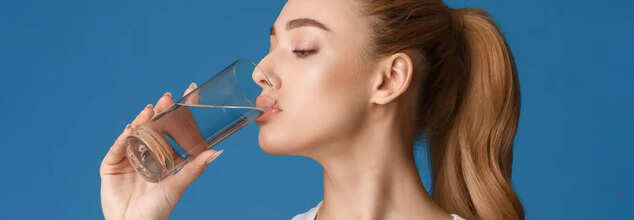
Credit: Canva
How A Pinch Of Salt In Your Water Can Transform Hydration
Most of us know that staying hydrated is essential for overall health, but drinking plain water might not always be enough. If you’ve ever noticed yourself running to the bathroom frequently after drinking a lot of water, there’s a reason for that—your body might not be absorbing the water effectively. That’s where electrolytes, especially sodium, come in.
Role of Sodium in Hydration
Water alone doesn’t guarantee proper hydration. While drinking 3–4 liters of water a day is often recommended, much of it can pass through your system without being retained. This happens because plain water lacks essential electrolytes, which are crucial for maintaining fluid balance in the body.Sodium, a key electrolyte, plays a vital role in helping your cells retain water. When you drink water without sodium, your kidneys may excrete a large portion of it, leading to frequent urination and possible dehydration at the cellular level. Adding a small pinch of salt to your water can help your body hold on to the fluid longer, keeping you hydrated more effectively.
Benefits Beyond Hydration
In addition to improving water absorption, consuming water with a small amount of salt can provide other health benefits:
Prevents Electrolyte Imbalances: Sweating, intense workouts, or even just daily activities can cause electrolyte depletion, leading to symptoms like dizziness, fatigue, and muscle cramps. A balanced intake of sodium can help maintain electrolyte levels.
Reduces Headaches and Fatigue: Dehydration and electrolyte imbalances are common triggers for headaches and low energy. A slight boost in sodium intake can help restore balance and alleviate these symptoms.
Supports Nerve and Muscle Function: Sodium helps with nerve signaling and muscle contractions. If you’ve ever experienced muscle cramps, especially after sweating, it could be due to low sodium levels.
Aids in Digestion: Salt can stimulate the production of digestive enzymes, promoting better nutrient absorption and reducing bloating.
How to Add Salt to Your Water Correctly
If you’re worried about your water tasting salty, don’t be—a tiny pinch of natural salt is enough to enhance hydration without altering the taste. Here are some quick tips to do it right:
Use high-quality salts like Himalayan pink salt or sea salt instead of regular table salt, which may contain additives.
Add just a pinch (around 1/16 to 1/8 teaspoon) per liter of water. Too much salt can have the opposite effect and cause dehydration.
If you engage in heavy physical activity or sweat excessively, you may need slightly more sodium to replenish lost electrolytes.
The Bottom Line
Drinking plain water is good, but optimizing hydration with a small amount of salt can make a noticeable difference. By helping your cells retain water, reducing fatigue, and supporting electrolyte balance, this simple habit can improve how your body functions throughout the day.
So, next time you fill your bottle, consider adding a tiny pinch of sea salt—it’s a small change that your body will thank you for.
© 2024 Bennett, Coleman & Company Limited

